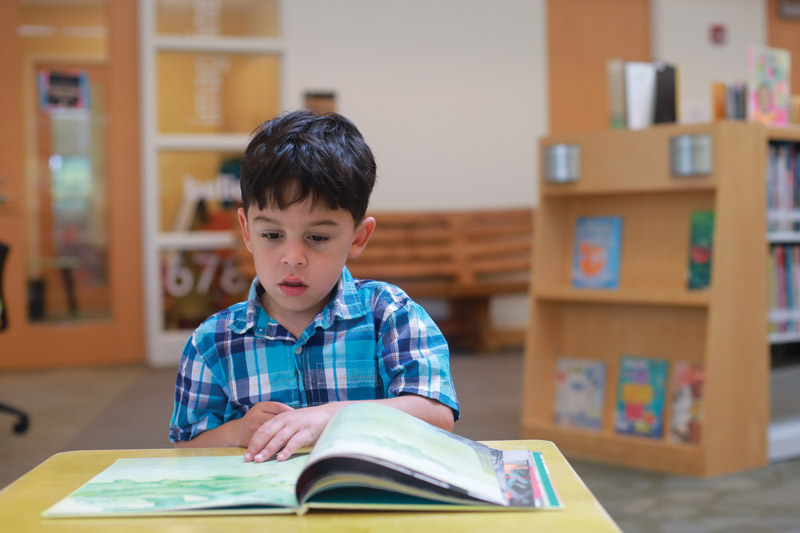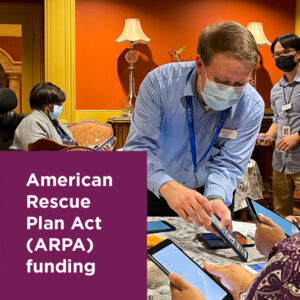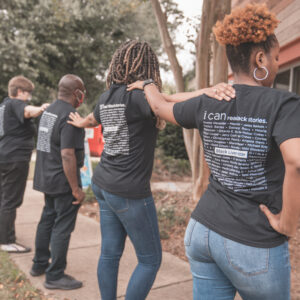
As we begin to survey the landscape the pandemic has left behind, our focus has been pulled to the impact made on our national education system. Nationally, children returned to the classroom with at least six to eight months of learning and educational development lost to time. The great pivot from in-person to online revealed how ill-prepared U.S. education systems were for such a massive shift in teaching and learning.
But it also uncovered a well of resilience, prompted a much-needed reevaluation of our educational systems nationwide, and strengthened and expanded digital portals to move us closer to access for all.
In all these aspects, your Library served as a knowledge leader, nimble mobilizer, and optimistic partner to the Herculean work of the educators in Mecklenburg County.
Meeting present and future challenges
In the short term, children and teens are playing catch up, while teachers strive to fill the gaps in learning while managing their own fatigue. As of early 2022, Charlotte-Mecklenburg Schools (CMS) were still operating in survival mode, with approximately 50% of support staff absent during the peak of the Omicron wave of the pandemic. Administrators began filling in for teachers, pulling them away from their work in professional development and school growth.
The long-term impacts are equally as concerning. From a recent article in McKinsey & Associates, they report “(t)he fallout from the pandemic threatens to depress this generation’s prospects and constrict their opportunities far into adulthood. The ripple effects may undermine their chances of attending college and ultimately finding a fulfilling job that enables them to support a family.”
The pandemic also revealed the long-standing inequities that exist in the U.S. education system. While correcting these issues creates an opportunity to build the system back fairly and sustainability, it will require a large collaborative effort to do it right.
No better place
There is no better place to help meet this challenge than what’s already established in every neighborhood – the public library.
Charlotte Mecklenburg Library (CML) has long been a national model for providing integrated and supplemental services to students, teachers, and parents. CML was one of the first public library systems in the U.S. to go virtual during the pandemic – leading the way with online programming and one-on-one tutoring. They quickly scaled up their virtual services and created outreach kits to educate their patrons about the expanded virtual offerings. Library systems in Florida, Georgia, South Carolina, and Missouri reached out to Charlotte library staff during the pandemic for the strategies and workflows they developed to help meet the community need.
Before the pandemic hit, the Library had already established a strong partnership with CMS. Library staff work with neighborhood teachers and administrators to ensure the curriculum is supported and aligns with the Library’s collection and resources. In fact, each and every school has a public library staff member solely dedicated to them.
Through ONE Access, or “One Number Equals Access,” student ID numbers serve as seamlessly integrated Library accounts with access to everything the Library has to offer, putting the stacks right at students’ fingertips.
Librarians send monthly personalized communications to every CMS school, keeping them updated with the latest programming, support services and more.
Collaborations between the Library and schools are relational, not transactional – building a cohesive and beneficial partnership that organically fits the needs of the school and its students and teachers.
Resilience in action
While it’s clear that the pandemic has impeded academic progress, some educators caution a doom-and-gloom mentality. Focusing on the social and emotional well-being of students and teachers may be just as important as the academic after this historic world-altering event.
When we talk about learning loss, students are listening. Talking about them as permanently damaged learners? I think we need to convey some respect for what they have endured, what they have learned, and how they have developed despite the immense challenges of the last 18 months.”
Janelle Scott, education policy scholar, UC Berkeley Graduate School of Education, “As K-12 students return, schools shouldn’t obsess over pandemic ‘learning loss’”, Berkeley News, August 11, 2021.
As our libraries begin to make physical spaces available again, Library CEO Marcellus Turner reflects on how the environment itself can help motivate and support students. During the early days of the pandemic, he witnessed students sitting outside of a Taco Bell, using the restaurant’s Wi-Fi to access their remote classrooms and do homework.
“It’s amazing how much can happen when you offer a child a table and a chair,” he said. “They need spaces that are quiet, comfortable and safe, where they have access to real live support and resources.”
Even though places are opening back up, those virtual spaces aren’t going away. With thousands of students attending online programs and connecting with one-on-one support in the past year, the Library has permanently expanded its reach outside the walls. This includes the new broadband access initiative in the West Boulevard corridor called MeckTech Connect.
If the question is “how is our community combatting learning loss?” then the Library is an important part of the answer. The Library provides physical and virtual wrap-around services and programming to support our community’s schools. It provides supplemental and experiential learning with programs like Storywalk® and makerspaces.
The Library has always been a place where all are welcome. It’s also a space where we can teach, support and grow our children and teens while healing the gap in their educational journey with intentionality and compassion.



